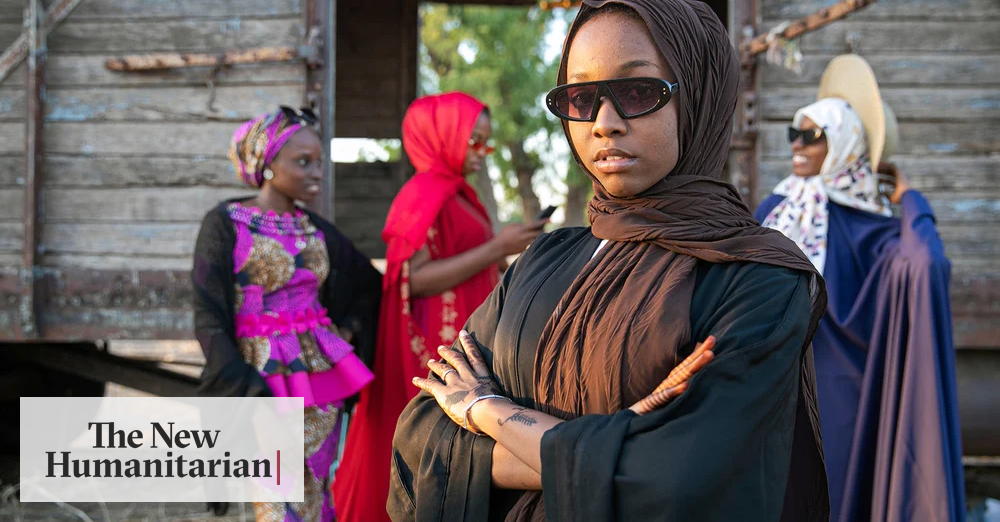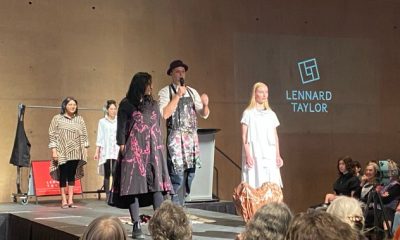Fashion
The New Humanitarian | My hijab: Nigerian Muslim ladies on religion and vogue

What’s in anybody’s wardrobe is inherently political. That’s very true in Nigeria’s northeast, a area on the centre of a more-than-decade-long jihadist battle the place how a girl attire comes beneath explicit scrutiny.
Most Muslim ladies in the primary metropolis of Maiduguri, the birthplace of Boko Haram, imagine their faith calls on them to cowl their hair, and can put on not less than a scarf often known as a hijab, often paired with a floor-length robe.
How thick or lengthy the hijab, how unfastened or tight – adorned or plain – the robe, is all wrapped up in cultural perceptions of how a northern lady ought to gown.
On the extremist finish of the dial are the jihadists, who obsess over the management of girls and their our bodies. Their puritanical ideology holds that girls ought to be largely confined to their properties, and, when out in public, as nameless as attainable.
READ MORE: The gown code
Veils, headscarves, vibrant robes – even socks and gloves for the extra conservative – what Muslim ladies put on displays a tradition of “modesty” and a negotiated and shifting thought of applicable apparel.
The passages within the Quran recommending what immediately is known to be a hijab means “overlaying” is usually interpreted as a non secular responsibility. Even amongst ladies within the northeast who describe themselves as feminists, the dialogue is much less in regards to the rights and wrongs of this injunction, however the broader – and evolving – challenge of girls’s place in society.
For Muslim ladies, there are a selection of conventional hijab and robe types to select from, depicting variations in area and sophistication. From the lengthy gele veil, to a good bodice atampa in African ankara print, or a extra conservative Gulf-style abaya.
By taking part in with size, pairings, and match, cultural apparel will be creatively reinvented.
However a brand new era of girls within the northeast rejects that hyper-masculine creed. Dressing modestly is their selection, they are saying – an expression of their spiritual id, not a gown code commanded by the jihadists, nor a image of their diminishment, as some view the hijab.
The New Humanitarian sat down with 4 upwardly cell younger ladies – Aisha Muhammed, Fatima Lawan, Samira Othman and Zainab Sabo – to get their tackle the adjustments underway in gender relations within the northeast, and the way that’s mirrored in vogue.
To seize the texture and flavour, the 4 have been photographed on the metropolis’s derelict railway station by Fati Abubakar, a photojournalist from Maiduguri who has chronicled the impression of the struggle on her house area.
The station is throughout the street from a pile of rubble as soon as often known as the Markas or “centre”, the previous house of Boko Haram when it was nonetheless simply an extremist sect. It was bulldozed by the military in 2009 after the group launched a short-lived riot that marked the start of their jihad.
“Across the railway station space, younger ladies weren’t free to maneuver round [during the days of Boko Haram],” stated Zainab, who runs a bakery enterprise. “Boko Haram got here up with one thing new that was very excessive; they have been forcing their views on individuals.”
However right here, a decade on, this group of graduates is proud to don their hijabs, and decided to depart a mark on society. By totally proudly owning the headband, they’ve turned it into an merchandise of couture, to be worn with model and panache.
“It’s totally different from 10 years in the past [when Boko Haram was active in Maiduguri]. Then, there can be that stigma that you simply weren’t dressing accurately,” stated Aisha, an area NGO employee. “However now I’m carrying my small little veil, and I be happy!”
These ladies embrace a worldwide modesty motion that argues vogue needn’t be revealing or a problem to 1’s religion. They described how social media permits a pan-African sharing of the hijab aesthetic – an empowering affirmation of their id as Muslim ladies that transcends Boko Haram’s parochialism.
Though there’s a cultural necessity to “overlaying”, they argue it’s their selection as Muslim ladies – regardless of the social stress and the much-debated notions of “selection” and autonomy.
The bigger battle
Gown code conformity wins Muslim ladies within the northeast a stake in a much bigger battle. Compliance permits them to compete within the job market, and with that comes better private independence and monetary safety – all anathema to the jihadists.
The surge in support and growth cash to the northeast has created job openings that girls have enthusiastically stepped into. Extremely-conservative gender roles have been additional eroded by the financial fallout of the battle, with everybody in a Maiduguri family now anticipated to drag their weight.
“You’ll be able to’t rely in your father or husband as the only supplier; you must flex your entrepreneurial abilities,” stated Fatima, an support employee, referring to the welter of recent home-based companies, from fragrance and cosmetics to IT.
“Everyone is doing one thing,” she nodded. “It’s nonetheless very exhausting [because of the state of the economy], however the variety of ladies that now have abilities and are hustling – that is the height.”
READ MORE: Altering tradition
Tradition does change – typically shortly, typically slowly. Traditionally, veils have been uncommon within the northeast. As a substitute, variations of hairstyles – for each women and men – have been necessary markers of age and standing, particularly among the many Kanuri, the most important ethnic group within the area.
However the Seventies noticed the start of the unfold of a stern wahhabi doctrine from Saudi Arabia. Non secular leaders who had studied within the Gulf promoted the hijab, embraced by Maiduguri’s educated elite as a part of a rising spiritual revival.
The modesty motion supplies a brand new twist: From the hip-hop and industrial excessive road fashion-influenced hijab widespread within the West to the extra conservative attire of the Gulf and Turkey favoured by ladies in Maiduguri.
However there was a worldwide counter response to modest vogue by some male trolls. They argue that by jazzing up their hijabs, and being hypervisible on Instagram, ladies are ignoring the essence of the headband.
That unfavorable, regulatory voice can be heard in Maiduguri, stated Zainab.
Sitting round a convention desk in a personal home transformed to workshop rooms – one small instance of the impression of the event business – these ladies see themselves as having way more alternative than their moms ever did to impression society.
“No person can cease us. We’re shifting ahead,” stated Aisha, caught up within the positivity across the desk. “Once you’ve tasted freedom – particularly the monetary independence half – no person desires to return to the best way it was.”
Past the town
To this point, so center class. However gender roles are additionally being tentatively reshaped within the displacement camps, bursting with individuals who have fled the agricultural areas the place the struggle is being fought – a battle that has killed not less than 35,000 individuals and compelled greater than two million individuals from their properties.
Girls-headed households are widespread because of the deaths of husbands and sons – or their detention by the safety forces. Even when there’s a man round, wives obtain direct support funds, which provides them a measure of management over household spending.
Yakura Abakar sews conventional caps to complement her meals ration within the Dalori displacement camp, simply outdoors Maiduguri. She now sends her daughters to high school, which had not been the case in her outdated rural village, near the city of Dikwa, close to the Cameroonian border.
“Girls have develop into very sensible, very energetic,” Abakar informed The New Humanitarian. “These younger [NGO] ladies educate us do issues, and a few of the attitudes we’ve learnt from them.”
Nevertheless it’s extra a case of incremental change than revolution. Boko Haram’s austere gender authoritarianism has deep roots inside conventional society. No matter softening has taken place on the margins, the gender dynamics imply that males – as world wide – nonetheless retain appreciable political, financial, and cultural energy.
“As a girl, you’re judged on a regular basis,” stated Samira, one of many 4 interviewees. “Males do worse issues, the true haram [forbidden] issues, however patriarchy says that it’s all the time the lady who’s flawed.”
READ MORE: Worry of the hijab
Within the majority Christian south of Nigeria, carrying a hijab has additionally develop into politicised. For some, the headband is synonymous with “Islamisation”, a part of a perceived plot to overturn the nation’s secular structure: Faculty school rooms have develop into a selected level of friction.
Crises pushed partially by identity-based tensions have deepened beneath the northern-led authorities of President Muhamadu Buhari: the jihadist battle, increasing banditry that’s linked to younger Muslim pastoralists, and a rising demand for secession by the militantly Christian southeast.
“What hijab-critics want to grasp is that it’s not being worn for you – it’s being worn by Muslim ladies who need to cowl and be modest as a part of their freedom of expression,” Rahama Baloni, a battle specialist, informed The New Humanitatrian.
When she labored within the cosmopolitan capital, Abuja, Baloi stated she was at instances teased by colleagues that her hijab denoted sympathy for Boko Haram.
“I don’t align politically on the premise of my hijab,” she defined. “My hijab doesn’t outline what I imagine in – nevertheless it’s what you grew up with; it’s what you are feeling snug with.”
But the ladies across the desk have been assured they have been asserting a brand new Islamic imaginative and prescient of feminism – one paying homage to the early days of their religion and quranic beliefs of equality. What went unsaid was what occurs to ladies within the northeast who transgress, who ignore the cultural guardrails – and who units the punishment?
The male backlash
Hauwa Mahdi, an educational who has carried out key work on the hijab in Nigeria, informed The New Humanitarian she remembers strolling previous a mosque in Maiduguri within the Nineteen Eighties carrying a hijab, but in addition denims. That drew livid shouts from males within the space who accused her of being “disrespectful”.
“You’ll be able to’t be in a Muslim nation and simply exit anyhow; you’ll be shortly judged as ill-mannered,” stated Aisha, explaining the sensitivity of compliance. “It’s a northern factor. The tradition, whatever the faith, is to cowl. Even Christians [in the northeast] are extra snug overlaying their our bodies.”
Aishatu Kabu stop a global NGO job to begin her personal ladies’s empowerment organisation. In a area with the nation’s worst social and well being indicators for girls, freedom to put on what you need is just not on her checklist of priorities.
“What we’re battling for right here is towards little one marriages, the necessity for ladies’ schooling, reproductive well being – we haven’t gone past that degree but,” Kabu informed The New Humanitarian.
She fears the gender beneficial properties made to this point are fragile, {that a} backlash is constructing amongst males over their perceived lack of management, which extends from displacement camps – the place males are resisting the women-centred focus of support supply – to the marital house.
Mahdi, the educational, can be involved. “If ladies will not be organised to protect their [empowerment] wins, then, as quickly as peace returns, it’s again to the kitchen,” she defined. “That’s how patriarchy operates.”
But Zainab, the baker, insists her era of girls is “woke” and totally different.
“I’ll inform my daughter: ‘Know your rights, love your self, and all the time have your personal cash!’”
























